Growing older, growing wiser
At 34 years old and after more than a decade in the peloton, Erik Zabel has seen, experienced and...
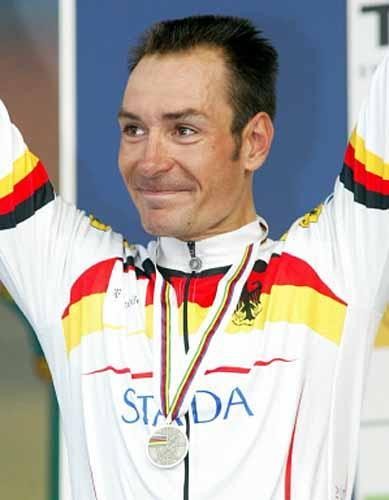
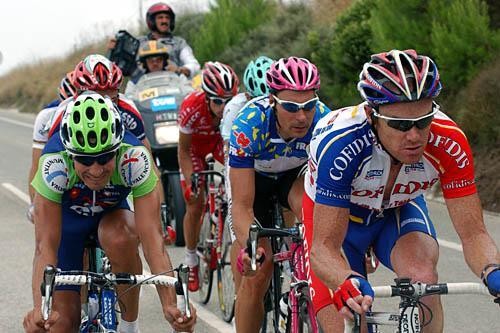
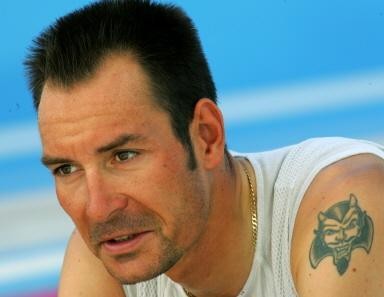
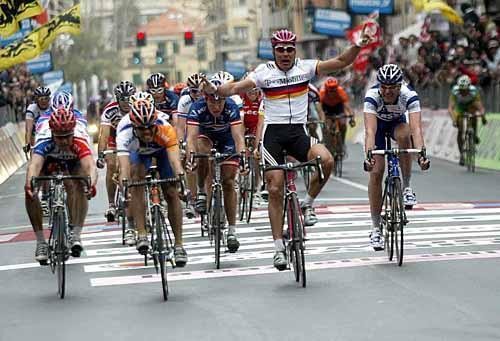
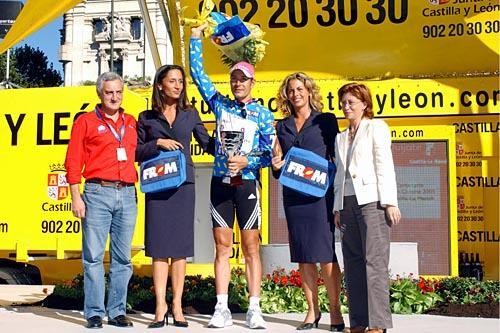
An interview with Erik Zabel, October 6, 2004
At 34 years old and after more than a decade in the peloton, Erik Zabel has seen, experienced and enjoyed just about everything cycling has to offer - that was until his encounter with Cyclingnews' Martin Hardie on the final day of this year's Vuelta a España.
During my three weeks of reporting at La Vuelta, I had the opportunity to make the acquaintance with a couple of riders that have always really made me feel good about cycling. One was my compatriot Matt White, the other was Erik Zabel - I had never met either before. Zabel was always thoughtful when I managed to greet him in the morning. His English is careful and well spoken, but you are never sure whether his Germanic dryness isn't at times being used in jest at either your or even his own expense.
Anyway, that first morning I introduced myself to Zabel and asked him if he spoke English, Spanish or German, all of which he replied, "Noh."
"Cyclingnews... that is only for Australian riders?". I asked him if he was pulling my leg and he said, "Oh noh".
I thought, I have to do something about this notion that he has about Cyclingnews - was he serious? "How about when it's quiet we sit down and have a chat," I asked. "Ja, that would be good," he told me.
Zabel had been duking it out with Stuart O'Grady throughout the second week of the race through Valencia and Murcia. By getting into some opportune moves, like the one to Xorret de Catí, O'Grady, Zabel and Oscar Freire had made the points competition look like a real battle that could be played out all the way home. But into Andulacia, Oscar and Stuey succumbed to one of the race's two viruses, the Verona preparation bug.
Get The Leadout Newsletter
The latest race content, interviews, features, reviews and expert buying guides, direct to your inbox!
With the departure of O'Grady, the points competition sort of fell into a lull. Without thinking through the realities and peculiarities of La Vuelta's points classification and as the G.C. hotted up, my attention got distracted from Zabel's battle for the points. But after La Covatilla and Valverde's crack there, Kelme refocused attention and this also drew back into focus the fact that young Alejandro wasn't that far off Erik's lead.
The last week of a Grand Tour seems eternal, to say nothing of the two weeks that have already passed into history but continue to form a coherent part of the present. As you near Madrid, there is a feeling of hope that home is not too far away, but also of a sort of loss as the friends and experiences that have seen so permanent for the period of life in the caravan now appear so totally transient.
As I stood in the Madrid sun and headed to the shade of the awning of the T-Mobile bus, I turned to find a seat and settle down on the team's esky to have a Sunday morning chat with Erik Zabel before he started his final time trial.
"How are you feeling?" I began, feeling a little uncomfortable.
"Happy to see Madrid," he replied.
Always a close competition
"Erik, can we talk about the points classification? I think if Valverde comes sixth in the time trial you will be tied in the points competition, is that right?"
Erik leans back. He has the camping chair and his back to the bus looking out at the visitors to the start village. He calls a young boy over to be closer when his mother takes a photo. "Oh, it's just a mathematical example - if he is in the first six, he wins the points classement, if not, I do. I am not the best time trialist, so it's not on me today... what goes around comes around."
I started to try and focus on the way the competition has been interesting throughout: 'It has been a nice competition because in the beginning we had to you, Freire and O'Grady fighting it out, but they went home, and now we have...'
"Ja, but in the Vuelta," Erik interrupts, "it is always close in the points classement, because it is different to the Tour, where on the flat stages I earn more points than in the time trials or the mountains. But here it's different. Even the team time trial has points for the classement. So everyday, the same points are available; first 15 places get points and because of this points system, it makes it much more interesting.
"I remember in 2001 I lost by four points against [Jose Maria] Jimenez... I won three stages and he won four; I won mostly on the flat and he in the mountains and in the end, there was four points between us. So the competition is always much closer here, between a couple of riders, and of riders of different types."
Petacchi and the sprinting game
With that explained, I searched for a way to ask Erik about the stranglehold of Petacchi in the sprinting game. Whenever Fassa arrive intact, Petacchi appears to be the inevitable victor. What was the answer to Petacchi's dominance?
'I wanted to ask you something about the sprinting game at the moment. Most of the teams, yours, Stuart's or Oscar's, well they don't... Put it this way, before you had a team that worked for you and led you out strongly in the sprints - now the team rides more for the GC riders, and what you are up against is Fassa Bortolo and Petacchi.'
In his answer, I got the first glimpse of Zabel's not wholehearted acceptance of some of the trends of modern cycling.
"For me it is very interesting, because I remember years ago the teams from Ferretti were always very exciting, teams with an aggressive style, attacking teams... there was not one time were Ferretti's teams were working only for a sprinter or for sponsors. But now it is one of the only ones, maybe the only team that has a train, like before with Saeco with Cipollini or sometimes Telekom with me..."
'I can remember Jan Ullrich and Bjarne Riis leading you out at times in the Tour for example," I interrupted.
"That's right - now there is no question that Petacchi is the fastest sprinter in the world. So all the other sprinters have a problem to beat him, and so it means that the managers are going more toward changing the style of the team to include some mountain riders, all rounders."
Life after the sprint
The finish at Castellón and the break that included Freire, O'Grady and Zabel on the way to Xorret de Catí highlighted again how some sprinters, mellow into grand Classics riders as they get older. 'Guys like yourself, we saw it with Jalabert, we see it with Stuart... as you guys get older, you seem to become more of a classics rider in a way, rather than just a sprinter?'
"Jaaaa...." was all he said.
'How many years left do you have in the pro peloton?' I asked.
"I don't know; I have a contract for next year..."
'How old are you now?'
"Thirty-four, so I am still having fun, riding my bike, in competition, and I think that is important. It's hard because in a peloton, so many things change... but I have still enjoy my job; I still have fun and when I'm still good enough to follow the other riders, I will be there."
And how would Erik like to spend the twilight of his years in the peloton, I wondered. Without a prompt, he said something that really surprised me.
"One of my dreams is that [Walter] Godefroot, the manager of our team, takes Davis, Allan Davis under contract, and I will be his lead-out man for one or two years more to help him to be one of the best sprinters."
'You think he has got class?' I asked, unsure whether he was winding me up again.
"When he comes [to Europe] in February, every year he is in good shape from the races in Australia, and then in Vuelta of Majorca he is nearly unbeatable... I think with very good lead-out men and with a little more experience, he will be like Tom Boonen in the sprints."
'I heard a few days ago from someone close to the Australian team that he actually thinks Allan Davis could win in Verona ...'
"Why not?" says Zabel.
Milan San Remo - what happened?
Feeling at little more at ease, I wondered about broaching that finish in Milan-San Remo. Zabel has won the race a mountain of times as if he owned it, so his elation at thinking that he got it again back in March was understandable. I finally managed to ask, 'I don't want to ask you this but I also do: what actually happened in San Remo?'
Zabel leans back in his chair again and laughs, before coming forward to say, "I think that I was too focused on Petacchi and also with the radio I had the earphone in my right ear... "
Are these the two of the woes of modern day cycling for Zabel - Petacchi and radios? Well, Petacchi no - Zabel recognises the answer to Petacchi's dominance is to attack in different ways - but did he lose San remo because of the radio?
"I think that for a sprinter, it is not good to ride in the final with this earphone because you lose a little bit of your instinct...
"You see, I didn't feel that Freire was beside me... I didn't hear him, and I didn't think that there was anybody there. Without the earphone, I would sprint until the line and make a tiger jump, and I think it would have been much closer. Maybe if Freire beat me anyway, I think it would be a question of a photo-finish.
"But anyway, I didn't see him, I didn't hear him, I didn't feel him, I didn't feel that there was somebody next me. I was sure I was the winner of the race and then when I went up, for sure I lost three kph and Freire is one of the guys in the peloton who has the best punch to the line... so it was for sure a big mistake!"
All I could do was respond and say, 'Yeah, it was a little mistake but horrible...'
Zabel then reinforces his previous words. "If I had of been sprinting until the line then it is no problem because he was clearly the fastest man that day. But when you make a mistake like I did... maybe it will be for my whole life that I will be thinking about this - what would have been if I hadn't taken that decision."
Someone kill the radio car
So do you think the radios cause cycling to become more machine-like?
"Yes, and I am... Well there are two sides: that cycling is much safer now because in the earlier years, the sporting directors in the cars, especially the ones that are nervous, are driving inside the peloton, inside the bunch and talking to the riders, so for that it is much more safe now... but in terms of the cycling sport, it turns it into another direction. So for me, I would like that the UCI to forbid radios so that it brings back more confidence in ourselves.
"It is also important to have an instinct like a cyclist and to make your own decisions. I think it's also important that the riders take decisions, any decision, even if it is the wrong one. But now it's always talking over the radio - we have this situation or that situation, what do we do now... it's always your sporting director who makes the decision in seconds after a situation [occurs].
"Maybe a breakaway goes with somebody important in it and after a minute the decision is made: 'OK, we now ride... it makes it very hard for people to stay away and sometimes when one of the contenders slips a little, or is passed in an important situation, the race is a little more interesting... so for me, the radio is for some reasons good and for some reasons not."
Not all that glimmers is gold
I ask Zabel how different cycling is today compared to the last 14 years and how he grew as a junior. Is there much difference between the old DDR system you grew up in to the cycling world of today? I mention the DDR system, but also note the Australian cycling program bares a strong resemblance to the East German model, both achieving great success.
"Oh yes, the Australian system has produced many good track riders, but about cycling before and today... I think that cycling is always a conservative sport and traditionalist system. Some things change - nearly every big team now has a bus and it's much more professional - but you have to still ride your bike and do your job. Not all that looks like gold is blinking; for me, it is not so important where you grew up but how you are."
On that note, I bid my farewell and leave Erik to get himself ready for the time trial. Cadel Evans, behind us, had spent some time of the trainer and was having his bags organised and put in the car. He didn't intend to hang around Madrid long at all.
I jumped in my car and followed a bunch of riders to the finish, where I could set up in the press caravan next to the finish and anxiously wait for Valverde's time. It wasn't enough and Zabel came out the winner of the points competitions. I was glad I'd met him; even if I had to wonder about his dry humour, I was nevertheless left thinking how friendly and intelligent the encounter was. And he was right - it was nice to see Madrid!
Other Talking Cycling Interviews